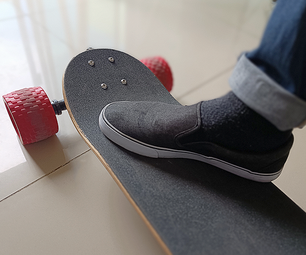Introduction: Injured Bird: What to Do - Step by Step
It's springtime & lots of baby birds are leaving their nests. But, some birds don't make it on their first flight...rather they end up on the ground, injured and helpless. If you find one of these injured birds, you need to know what to do - and take action fast.
Background & Disclaimer: I am not a bird expert, but found a baby house sparrow recently, lying on the pavement on it's back. It fell from the second floor of my home, where it had a nest underneath my air conditioner. I love animals, and couldn't leave it there to die. I didn't take the proper steps though - so hopefully you will be able to avoid the stress and exhaustive work I ended up undergoing to keep the little baby alive! Please read the whole instructable because I witnessed some amazing things happen after this bird was injured - and I will share it all below.
First, get a shoebox or small container & fill it with some leaves and papertowel, napkins or thick toilet paper. Make sure you have a lid for the shoebox and cut some holes or slices into it for air. Approach the bird & if possible, pick it up with some of the tissue or paper towel. Look it over & see if it can move, walk or fly. If it can fly, obviously let it go. But, if it was lying there it is most likely injured in some way and needs care.
Here is the tricky part - if you call a local humane society or animal care organization they will tell you to try to put it back in its nest. You know what, if you know the bird is injured (and you will know this by the fact that it cannot fly) then do not put the bird back in its nest. I almost killed the bird I found by doing this. I put the bird back in its nest and checked on it an hour later and it was almost dead from being so cold. It then also tried to fly again by hopping and almost fell to its death a second time. Do not do this if it is injured!
*** Important Note *** Do not listen to those old tales people say about how if you touch a bird the mother will reject it. It is not true at all. And I needed to hold my baby bird to give it care and try to feed it. The parents did not reject it afterwards. Birds don't have a good sense of smell & they recognize their baby from it's chirps and cries. Also, be sure to either wear gloves or wash those hands really well after handling it.
The most important thing to do now, is to get the bird warmed up. You can see if the bird is suffering from being cold because its skin will have a purplish color to it, rather than it's normal pink. Even if you can't see if it's cold, make sure you have a heating pad underneath the shoe box or inside it. It needs to stay very warm to prevent pneumonia. If you see that the bird is breathing deeply or shaking, it is in shock. Keep it in a quiet and warm place.
Call a local wildlife rehabilitation center. There are locations in every state - so you will need to do a search online or call your local humane society or the Department of Natural Resources. If you can't locate one or must wait a while before dropping the bird off for care, you will need to tend to the baby bird to keep it alive until then.
My mistake was that I didn't get the bird into the rehab center the first day I found it. I didn't realize it had a broken wing and tried to reunite it with its family.
Feeding Tips if the Bird Family is Around:
- If you need to buy some time before you can drop the bird off, then I recommend you first try to take the bird in the shoebox outside near where you found it. Make sure it is as warm as it can be with the unplugged heating pad next to it when you put it out there.
- Then step aside and far away to observe. I did this, and within 30 seconds its father swooped down to it and jumped inside the shoebox. It then scampered around for seeds (I just put a bird feeder out thankfully) and it picked through them, grabbed one and fed it to the injured baby.
- It did this numerous times. When it left, I then brought the baby bird back inside to warm it up. I did this about every half hour - as they are supposed to eat that often.
- Robins, Starlings and other insectivores: tinned cat or dog food, preferably beef for robins; small pieces of earthworm can also be offered on the end of a toothpick - or mushy cat food moistened with water
- Sparrows and other seed eaters: slowly scrambled eggs which can be moistened with water for babies; budgie seed and wild bird seed can be offered to adults
- Cedar waxwings: grapes, blueberries and other berries cut into small pieces
- Hummingbirds: 4 parts water, 1 part sugar - boil water, dissolve sugar, cool to room temp - this nectar can then be offered at the tip of the beak with an eye-dropper
Lastly, try not to become too attached to the little injured bird. My son was a bit hysterical at how ill the bird was. He was crying because he thought the bird would die - and I didn't get the bird into the rehab center until the 2nd day after finding it. It barely survived the night and looked very near death the morning after I found it. I think the bird survived because of my desperation - because of my son and his feelings too. The morning after it spent the night in my house, after giving it some food and water and warmth - it started to seem a bit revived. I got it to the rehab center and it was cared for!
* Cool Piece of Info * I made a short video clip when I put the baby bird outside. I saw it chirp and its father began chirping loudly - then its father swooped down to feed it. Later, when inside and the bird looked very low on life and energy and I needed to try to feed it, I played the video clip and when it heard the sound it became re-energized and began chirping and opening its mouth so I was able to feed it easier. I played it on and off for the bird and it helped keep it alive!
Update!!! It is very common for birds with injuries to not survive, unfortunately. Thankfully, by some miracle, my baby bird did survive at the rehab center and they let the bird go free after it was all healthy. Maybe I'm too sentimental, but I just wished they would have let me take him back home to set him free here, with his family!













